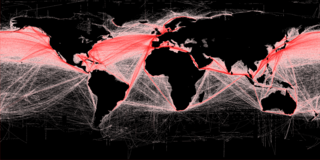
Freight transport, also referred as freight forwarding, is the physical process of transporting commodities and merchandise goods and cargo. The term shipping originally referred to transport by sea but in American English, it has been extended to refer to transport by land or air as well. "Logistics", a term borrowed from the military environment, is also used in the same sense.

In transportation, freight refers to goods conveyed by land, water or air, while cargo refers specifically to freight when conveyed via water or air. In economics, freight refers to goods transported at a freight rate for commercial gain. The term cargo is also used in case of goods in the cold-chain, because the perishable inventory is always in transit towards a final end-use, even when it is held in cold storage or other similar climate-controlled facilities, including warehouses.

A freight rate is a price at which a certain cargo is delivered from one point to another. The price depends on the form of the cargo, the mode of transport, the weight of the cargo, and the distance to the delivery destination. Many shipping services, especially air carriers, use dimensional weight for calculating the price, which takes into account both weight and volume of the cargo.

Less-than-truckload shipping or less than load (LTL) is the transportation of an amount of freight sized between individual parcels and full truckloads. Parcel carriers handle small packages and freight that can be broken down into units less than approximately 150 pounds (68 kg). Full truckload carriers move entire semi-trailers. Semi-trailers are typically between 26 and 53 feet and require a substantial amount of freight to make such transportation economical. The term LTL can refer to the freight itself, or to the carrier that transports the such freight.
A freight forwarder or forwarding agent is a person or a company who co-ordinates and organizes the movement of shipments on behalf of a shipper by liaising with carriers. The carriers may use a variety of shipping modes, including ships, airplanes, trucks, and railroads, and often use multiple modes for a single shipment. A freight forwarder does not move the goods but acts as an agent in the logistics network and will carry out freight consolidation, rate negotiations, shipment tracking, customs and other documentation, among other tasks. FIATA describes a freight forwarder as the "Architect of transport".
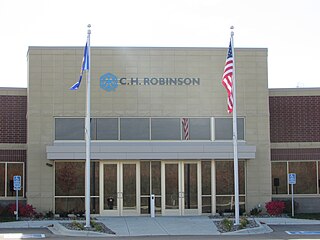
C.H. Robinson Worldwide, Inc. is an American transportation company that includes third-party logistics (3PL). The company offers freight transportation, transportation management, brokerage and warehousing. It offers truckload, less than truckload, air freight, intermodal, and ocean transportation.
The freight interline system is a system of relations between trucking companies, rail, and airline networks. Interline freight is cargo that moves between different transportation companies on its journey from origin to consignee. An interline exchange is a contractual transfer of goods from one company to another.
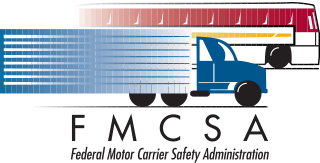
The Federal Motor Carrier Safety Administration (FMCSA) is an agency in the United States Department of Transportation that regulates the trucking industry in the United States. The primary mission of the FMCSA is to reduce crashes, injuries, and fatalities involving large trucks and buses.
New England Motor Freight, Inc. (NEMF) was a unionized less-than-truckload (LTL) and truckload freight carrier, based in Elizabeth, New Jersey. It was one of the largest LTL carriers in the US Northeast when it entered Chapter 11 bankruptcy in 2019 and subsequently shut down all operations in 2020.
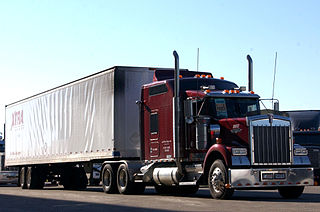
The trucking industry serves the American economy by transporting large quantities of raw materials, works in process, and finished goods over land—typically from manufacturing plants to retail distribution centers. Trucks are also used in the construction industry, two of which require dump trucks and portable concrete mixers to move the large amounts of rocks, dirt, concrete, and other building materials used in construction. Trucks in America are responsible for the majority of freight movement over land and are tools in the manufacturing, transportation, and warehousing industries.
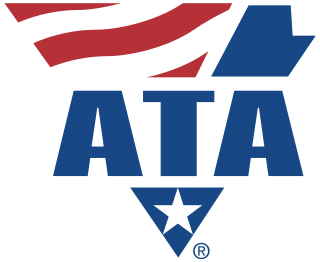
The American Trucking Associations (ATA), founded in 1933, is the largest national trade association for the trucking industry. ATA represents more than 37,000 members covering every type of motor carrier in the United States through a federation of other trucking groups, industry-related conferences, and its 50 affiliated state trucking associations. Former Governor of Kansas Bill Graves was replaced by Chris Spear as the ATA's president and CEO in July 2016.
DAT Freight & Analytics, originally known as Dial-a-Truck, is a US-based freight exchange service and provider of transportation information serving North America. Freight exchange services are used to match material ("loads") that needs to be shipped with over-the-road carriers, which can be hired to move those loads. DAT was established in 1978 and is part of Roper Technologies. It is co-headquartered in Denver, Colorado and Beaverton, Oregon. Satish Maripuri, President and CEO, is responsible for DAT’s strategy and execution.
Third-party logistics is an organization's long term commitment of outsourcing its distribution services to third-party logistics businesses.

XPO, Inc. is an American transportation company that conducts less-than-truckload shipping in North America. The company has headquarters in Greenwich, Connecticut, US, and 564 locations globally.
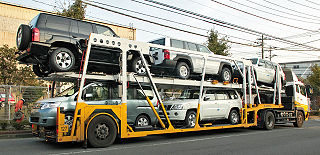
An auto transport broker is a type of cargo broker that specializes in the shipping and transportation of vehicles. Most vehicles shipped in the U.S. are cars and trucks, but many brokers handle boats, RVs, motorcycles and other types of vehicles as well. Auto transport is classified as "specialized freight trucking" under NAICS code 484230.
FreightCenter is a privately owned, non-asset based 3rd-party logistics provider (3PL) with headquarters in Palm Harbor, FL. FreightCenter acts as a conduit between freight carriers and commercial or residential shippers located in the United States and Canada. As a conduit, shippers use the provider's online freight quote calculator to calculate freight costs for less than truckload, truckload, rail, ocean and air freight.
A freight broker bond must be obtained by freight brokers and freight forwarders in the United States in order to obtain or renew their license.
A freight broker is an intermediary between a shipper and a freight service provider. Freight brokers can specialize in certain types of freight, such as equipment hauling on lowboys, oversize, bulk tanker, auto, or other types of freight transportation.
The freight technology sector, also known as FreightTech, refers to software companies and technologies which assist in supply chain management and the movement of freight. In the five years following 2014, investment in FreightTech companies grew from $118 million to $3 billion per year.

A container chassis, also called intermodal chassis or skeletal trailer, is a type of semi-trailer designed to securely carry an intermodal container. Chassis are used by truckers to deliver containers between ports, railyards, container depots, and shipper facilities, and are thus a key part of the intermodal supply chain.











